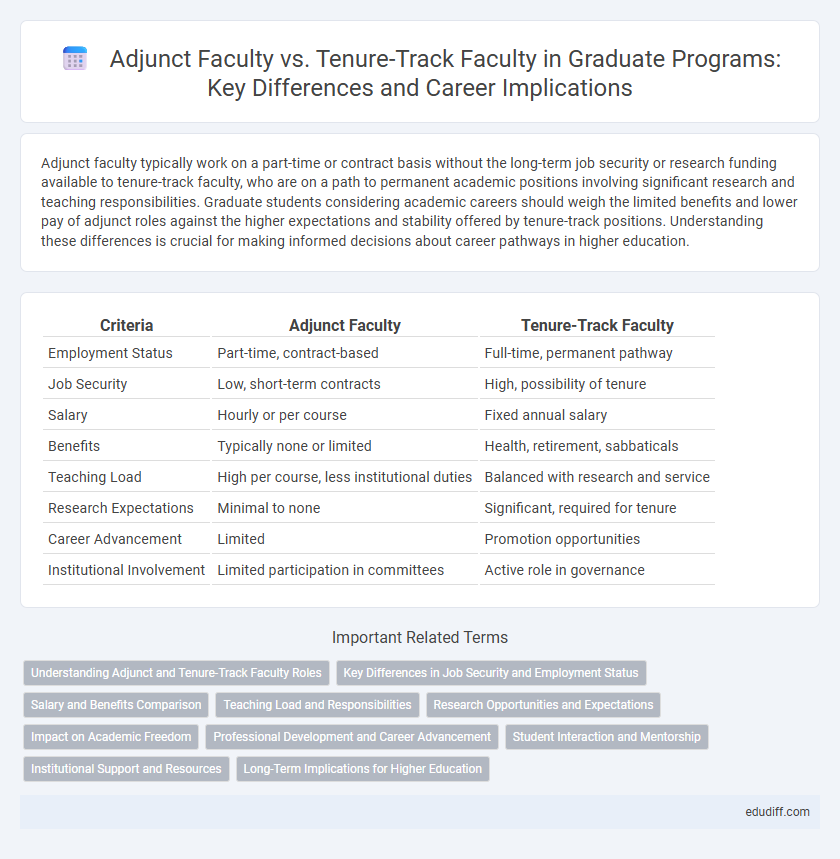Adjunct faculty typically work on a part-time or contract basis without the long-term job security or research funding available to tenure-track faculty, who are on a path to permanent academic positions involving significant research and teaching responsibilities. Graduate students considering academic careers should weigh the limited benefits and lower pay of adjunct roles against the higher expectations and stability offered by tenure-track positions. Understanding these differences is crucial for making informed decisions about career pathways in higher education.
Table of Comparison
| Criteria | Adjunct Faculty | Tenure-Track Faculty |
|---|---|---|
| Employment Status | Part-time, contract-based | Full-time, permanent pathway |
| Job Security | Low, short-term contracts | High, possibility of tenure |
| Salary | Hourly or per course | Fixed annual salary |
| Benefits | Typically none or limited | Health, retirement, sabbaticals |
| Teaching Load | High per course, less institutional duties | Balanced with research and service |
| Research Expectations | Minimal to none | Significant, required for tenure |
| Career Advancement | Limited | Promotion opportunities |
| Institutional Involvement | Limited participation in committees | Active role in governance |
Understanding Adjunct and Tenure-Track Faculty Roles
Adjunct faculty typically work part-time and focus primarily on teaching specific courses without long-term employment security or extensive research responsibilities, whereas tenure-track faculty hold full-time positions with expectations for teaching, research, and service, aimed at achieving tenure and job stability. Understanding adjunct roles highlights their flexibility and contribution to specialized instruction, while tenure-track positions emphasize career development, research productivity, and institutional commitment. Graduate students benefit from recognizing these distinctions to navigate mentorship opportunities and academic guidance effectively.
Key Differences in Job Security and Employment Status
Adjunct faculty typically hold part-time, contract-based positions with limited job security and no guarantee of renewal, while tenure-track faculty are full-time employees on a path toward tenure, offering greater employment stability. Tenure-track roles involve rigorous evaluation periods aimed at achieving tenure, which provides long-term job protection and academic freedom. Adjuncts often receive lower pay and fewer benefits compared to tenure-track faculty, reflecting their more precarious employment status.
Salary and Benefits Comparison
Adjunct faculty typically earn significantly lower salaries compared to tenure-track faculty, often paid per course with limited or no access to full benefits such as health insurance, retirement plans, or paid leave. Tenure-track faculty receive higher annual salaries accompanied by comprehensive benefits packages, including healthcare, retirement contributions, sabbaticals, and job security through tenure. This disparity impacts financial stability and career advancement opportunities for adjunct professors in graduate education settings.
Teaching Load and Responsibilities
Adjunct faculty typically carry a heavier teaching load with multiple courses per semester but receive less institutional support and fewer responsibilities outside the classroom compared to tenure-track faculty. Tenure-track faculty balance teaching with research, advising, and service commitments, often teaching fewer courses to accommodate these duties. The differing roles impact career advancement, with tenure-track positions offering a pathway to job security and academic governance.
Research Opportunities and Expectations
Adjunct faculty typically have limited research opportunities and fewer expectations to publish, as their primary focus often lies in teaching and professional expertise. In contrast, tenure-track faculty face rigorous research obligations, including securing grants, publishing in peer-reviewed journals, and contributing to their academic field's advancement. These research demands significantly impact tenure-track faculty's career progression and institutional evaluation.
Impact on Academic Freedom
Adjunct faculty often face limited academic freedom due to contractual job insecurity and institutional constraints, which can restrict their ability to explore controversial topics or innovate in teaching. In contrast, tenure-track faculty benefit from job protection and governance participation, enabling them to pursue research and pedagogy with greater intellectual autonomy. This fundamental difference profoundly influences the scope of scholarly inquiry and curricular development within graduate programs.
Professional Development and Career Advancement
Adjunct faculty often face limited opportunities for professional development and career advancement compared to tenure-track faculty, who benefit from structured support such as sabbaticals, research funding, and mentorship programs. Tenure-track positions provide a clear pathway toward academic promotion and job security, which enhances long-term career growth. Professional development for adjuncts tends to be sporadic and less institutionally prioritized, impacting their ability to expand skills and achieve higher academic ranks.
Student Interaction and Mentorship
Adjunct faculty often have limited availability for student interaction and mentorship due to part-time status and heavier teaching loads, impacting personalized guidance. Tenure-track faculty engage more deeply with students, offering consistent mentorship, research opportunities, and academic advising that enhance graduate education outcomes. This sustained faculty involvement is critical for developing professional skills and advancing scholarly careers in graduate programs.
Institutional Support and Resources
Adjunct faculty typically receive limited institutional support and have restricted access to resources compared to tenure-track faculty, impacting their ability to engage fully in research and professional development. Tenure-track faculty benefit from more robust institutional backing, including funding for research, access to graduate assistants, and opportunities for sabbaticals. These disparities influence faculty stability, job satisfaction, and the overall academic environment within graduate programs.
Long-Term Implications for Higher Education
Adjunct faculty often lack job security and comprehensive benefits, affecting faculty retention and continuity in higher education institutions. Tenure-track faculty positions provide stability, fostering long-term research productivity and academic development. The increasing reliance on adjuncts may impact the quality of education and institutional commitment to scholarly advancement.
Adjunct Faculty vs Tenure-Track Faculty Infographic

 edudiff.com
edudiff.com